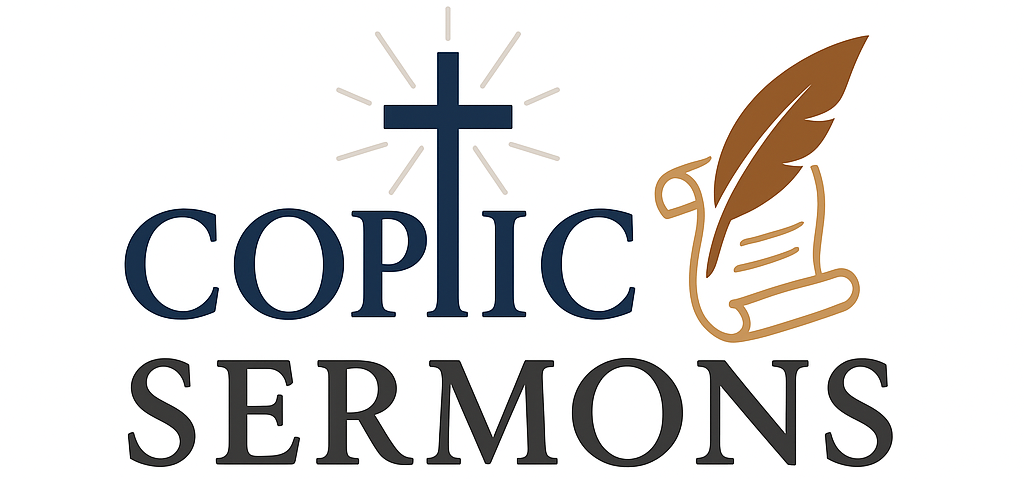Eyes Opened by Grace – Blind Man Sunday – Great Lent 2025
In the Name of the Father, and the Son, and the Holy Spirit, One God. Amen. May the blessing of the Father who calls us and His Only Begotten Son Jesus Christ who saves us, and the Holy Spirit who sanctifies and transforms us be with us all, that we may hear His word and bear fruit—thirty, sixty, and a hundredfold. Amen.
Introduction
On the sixth Sunday of Great Lent, the Church places before us the story of the man born blind—a Gospel rich with theological meaning, patristic insight, and practical call to transformation. It is traditionally called Blind Man Sunday, and among the early Church, it was known as Baptism Sunday because this story points us toward the sacrament of illumination.
The Gospel reveals Christ as the Light of the World, who alone can heal our inner blindness. From the moment Jesus encounters the man, the Gospel becomes a movement of divine initiative, human response, and growing revelation.
Patristic Insights
The Catena Aurea, compiled by St. Thomas Aquinas, offers a collection of insights from the Fathers that enrich our understanding of this miracle:
St. John Chrysostom notes: “The man did not cry out to Christ; he did not know who He was. Christ took the initiative, showing that divine grace precedes human action.”
St. Augustine sees the man as a type of the human race: “Blind from birth through original sin, unable to see the truth until touched by the Word made flesh.”
St. Irenaeus connects the healing act to creation: “Christ spat on the ground and made clay, echoing Genesis where man was formed from the dust. He re-creates what was lacking in the man, as He once formed Adam.”
Origen suggests: “The pool of Siloam, meaning ‘Sent,’ prefigures Christ, the One sent from the Father. Baptism, like Siloam, washes away darkness and reveals the Light.”
The man receives not just sight but illumination. He becomes a believer through the journey of faith, gradually growing from seeing Jesus as a man, then a prophet, and finally worshiping Him as Lord.
A Spiritual Reflection: The Journey from Darkness to Light
This miracle is not only about physical sight. It is about spiritual vision.
At first, the man did not ask to be healed. His healing came by grace, not by merit. Christ works when and where He chooses. This affirms the Orthodox understanding of synergia: God acts, and we respond.
His healing process is striking:
- Jesus spits on the ground and makes clay.
- He anoints the man’s eyes.
- He commands him to wash in the pool of Siloam.
Healing requires obedience. Though the man could not see Christ, he obeyed His word. And as a result, his eyes were opened.
This mirrors our own baptism. We are blind in sin until the Church, through water and Spirit, brings us into the light. This is why this Gospel is traditionally read to catechumens preparing for Pascha.
As the man receives his sight, his faith grows:
- First, he sees Jesus as a man.
- Then, a prophet.
- Then, one sent from God.
- Then, he defends Jesus before the Pharisees.
- Finally, he sees and worships Christ as Lord.
Faith is a process, not an instant event. This Gospel reveals that coming to Christ is a journey: from blindness to belief, from sight to worship.
Meanwhile, the Pharisees—who physically see—remain spiritually blind. Their refusal to believe shows that the worst kind of blindness is not of the eyes but of the heart.
“If you were blind, you would have no sin; but now you say, ‘We see.’ Therefore your sin remains.” (John 9:41)
Lessons for Us Today
- Grace Comes First: Christ saw the man first. We must remember that God’s love reaches out to us before we seek Him.
- Healing Requires Obedience: We must walk to Siloam. Grace is free, but a response is required. Let us live out our faith actively.
- Defend Christ Boldly: The healed man stood courageously before the Pharisees. He was cast out of the synagogue but gained life in Christ.
- Guard Against Spiritual Pride: The Pharisees teach us that religion without humility becomes blindness.
- Live as Children of Light: St. Paul says, “Now you are light in the Lord. Walk as children of light” (Ephesians 5:8). Let your thoughts, actions, and words reflect the Light of Christ.
A Word to the Catechumens and the Baptized
For those preparing for baptism at Pascha, this Gospel speaks directly to your hearts. You, like the blind man, are about to have your eyes opened to eternal truth.
For the baptized, this is a call to renew our baptismal light. Have we let our vision grow dim? Do we still walk in the light, or have we returned to shadows?
Let us pray today: “Lord, I believe. Help my unbelief. Open my eyes again, and let me walk in Your light.”
Closing Prayer
O Christ our God, Light of the World, who opened the eyes of the man born blind, open the eyes of our hearts. Heal our hidden blindness. Drive out the pride that blinds us from seeing Your glory. Strengthen us to proclaim You boldly, even if we are rejected.
Grant us to walk as children of light until we behold You face to face in the glory of Your Resurrection.
May the Lord bless us, transform our hearts and minds, that our homes may stand on the Rock, our hands serve in the harvest, and our hearts long for Heaven. Amen.
